Ashton visit to Iran sparks co-operation and controversy
- Published
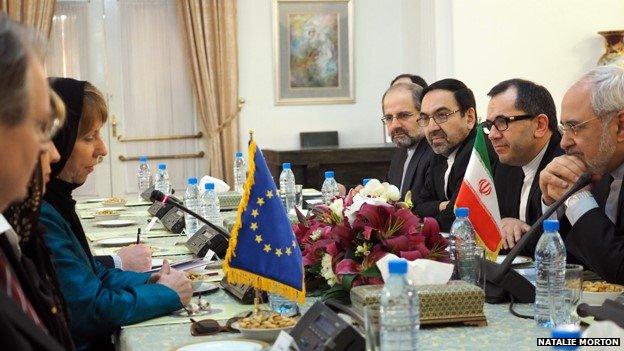
Catherine Ashton attended a meeting with Mohammad Javad Zarif in Tehran on Sunday
A visit to explore the potential for a new relationship between Iran and Europe has also ended up highlighting the enduring sensitivity of the old.
Hardliners have been on a political warpath this week after the first visit to Tehran by the European Union's foreign policy chief, Catherine Ashton.
"Do you think our country has no order that you can go anywhere you want and see anyone you want to see?" the head of the judiciary, Ayatollah Sadeq Larijani, demanded on Tuesday night.
Leading clerics from the holy city of Qom have now added their voice, accusing the West of "reviving the plot of the soft revolution", a reference to the widespread street protests - blamed on foreign powers - that were sparked by the disputed 2009 presidential election.
When Baroness Ashton first landed in Tehran last weekend, moderate newspapers hailed her arrival as an "achievement" of the reformist President Hassan Rouhani.
His Foreign Minister, Mohammad Javad Zarif, has established a good working relationship with Europe's top diplomat during their months of negotiations which led to November's landmark interim deal on Iran's nuclear programme.
Now Mr Zarif, as well as Intelligence Minister Mahmoud Alavi, has been summoned to appear before parliament to answer questions.
Hardliners have zeroed in on what is being denounced as Baroness Ashton's "controversial meeting".
Protest
Their target is a small gathering with seven female human rights activists at the very start of her mission, which coincided with International Women's Day.
The presence of Narges Mohammadi, the acting head of Iran's Centre for the Defenders of Human Rights, attracted some of the greatest attention.
She has been to prison five times since her days as a student activist, and is now on bail.
"The better Iran's relations with the world become, the more open the political climate in Iran becomes, and the more active our civil society," Ms Mohammadi told me.
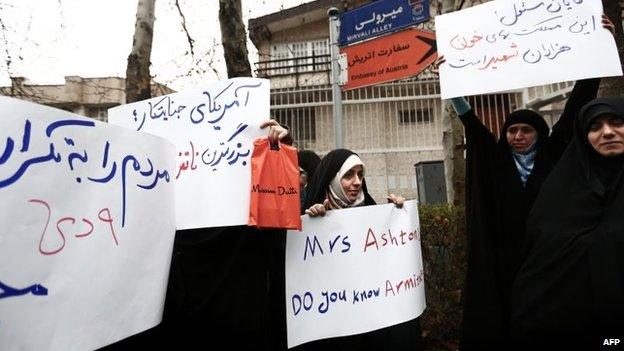
Women protest against Baroness Ashton's meeting with leading female activists in Tehran
Baroness Ashton spoke of "the great privilege to meet women to talk about issues for women in Iran and across the world," as she stood next to Mr Zarif at a news conference on Sunday.
On Wednesday, a small crowd of protesters, mainly from an Islamic Association of University Students, gathered outside the residence of the Austrian ambassador in Tehran where the meeting with the female activists - meant to be a low-key discussion - was held the previous Saturday evening.
"If Mrs Ashton is concerned about women and human rights, she should go take care of the women in Europe," one student association declared earlier this week.
"This backlash was to be expected," a prominent editor of one of Iran's conservative media told me. "It will subside."
Deep-rooted suspicion
But it is also clear the deeply-rooted suspicion will not go away.
Hardline politicians, still smarting from President Rouhani's emphatic victory in last year's elections, also see this as an opportunity to step up the pressure to try to weaken the reformist government, including negotiations on the future of Iran's nuclear programme.
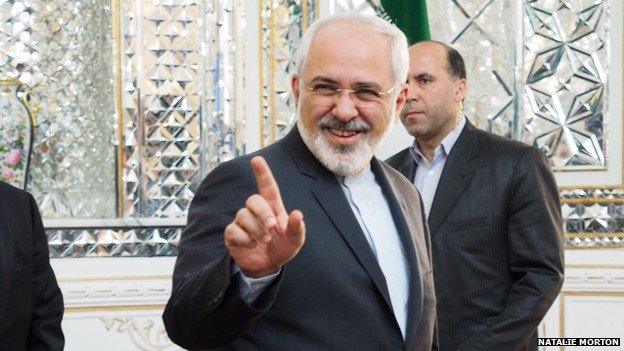
Mr Zarif has faced pressure from hardliners who accuse him of selling out Iran's nuclear programme
"They will try to keep the flame alive," said one Iranian commentator.
There has been less comment so far from more moderate media.
But a cautious appreciation of her visit was quoted earlier this week.
"It can have a positive effect on the process of Iran's nuclear talks and the promotion of our country's relations with the European Union," remarked Ahmad Shohani, a member of the parliament's security and foreign policy committee.
'Human rights dialogue'
As we walked through Tehran's crowded bazaars this week, Iranians often asked us what kind of impact her visit would have.
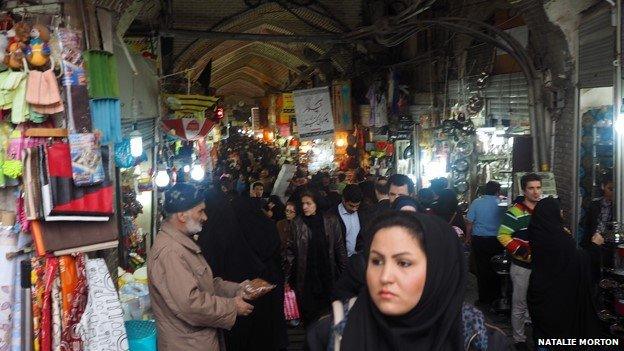
International sanctions targeting its key energy and financial sectors have crippled Iran's economy
"When senior officials visit it gives us hope," said Mehdi whose family has been in the carpet business for more than three decades. "When more junior officials come, we worry."
"We definitely welcome her visit," emphasised a woman carrying bags of Iranian nuts and sweets in preparation for the upcoming Persian New Year on 21 March. "It's not good to live in isolation."
"Ashton and her friends should deal with the government," insisted another man who lamented the high prices caused by years of international sanctions. "We cannot make a long wall around ourselves but the EU and the Iranian government have to show good intentions."
Baroness Ashton was clear from the start that human rights were an important part of her greater engagement with Iran.
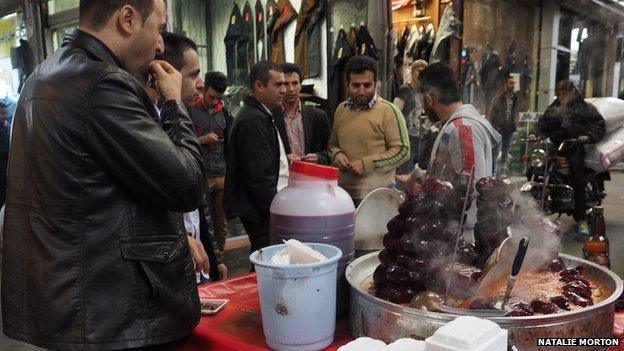
Baroness Ashton's visit was billed by one diplomat in Tehran as a "goodwill gesture from the EU"
She often makes a point of talking to women wherever she visits.
"She would have been criticised if she did not reach out to Iranian women, especially since it was International Women's Day," commented one of her advisers.
Her approach in Iran was carefully framed as a "potential human rights dialogue in future".
European diplomats say the idea to put human rights on the agenda was first suggested by Iran's delegation during a meeting at the United Nations in September.
'Cautiously optimistic'
Both Baroness Ashton and the Iranian leaders she met in Tehran have spoken positively about their talks earlier this week.
"I've met people who've played a role in Iran, not just now but historically, and we were able to talk about the potential to do other things, including human rights," Baroness Ashton told me and the few other journalists who came to cover her visit.
After meeting her, President Hassan Rouhani spoke of the need to "interact constructively" with the entire world, including Europe, based on "common interests and mutual respect".
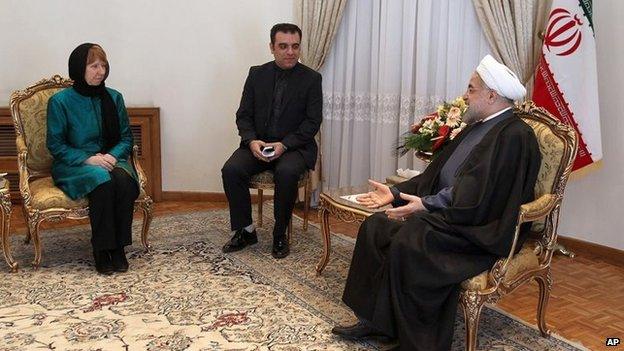
President Hassan Rouhani spoke positively of his meeting with Baroness Ashton
His unofficial Twitter account @HassanRouhani used the hashtag #Constructive_Engagement.
Mr Minister Zarif also spoke about the potential to co-operate in other areas, including action against drug trafficking from neighbouring Afghanistan, the battle against "terrorism", and the "dangerous" situation in Syria.
But Baroness Ashton also made it clear that progress on any front would depend on the success or failure of difficult talks on a long-term comprehensive nuclear accord, which will resume on 17 March in Vienna.
"I am leaving here knowing there is support for those who are going to come to negotiate," she told me. "But there's so much to do and we have to be cautiously optimistic."
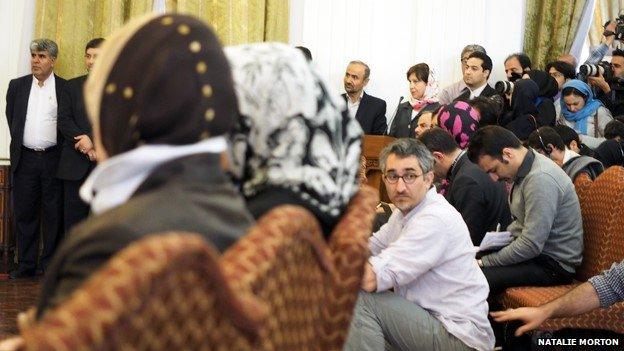
Baroness Ashton told journalists covering her visit that she had been able to talk about human rights
Even deeper scepticism was reiterated again this week by Iran's Supreme Leader, Ayatollah Ali Khamenei.
"Our officials have started negotiations. We hope they will come to a conclusion but we are not optimistic," he commented during one of his audiences.
Ayatollah Khamenei has repeatedly warned that the nuclear talks are a "pretext in the hands of the West" to interfere in Iran's affairs.
"Ashton has given some hope to the moderates, some food to the hardliners," was how one Iranian observer summarised this rare visit by a senior Western official. "This is Iran."